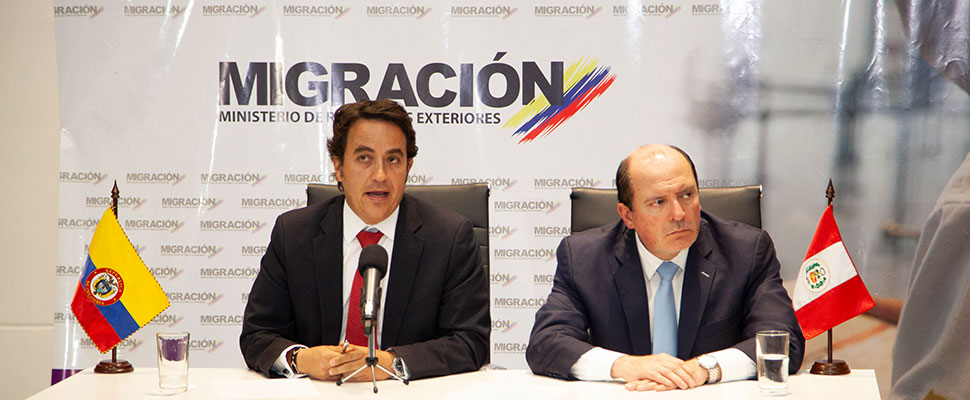Why did Peru and Colombia agree to create a database of Venezuelan migrants?
Both governments reached an agreement to jointly create and share a database of Venezuelan migrants between August 27 and 28, 2018

Creating and jointly sharing a database of Venezuelan migrants was the most important agreement reached by the immigration authorities of Colombia and Peru, at the meeting held in Bogotá between August 27 and 28, 2018. With this initiative, it will be possible to know and identify exactly the number of Venezuelan migrants who enter, reside or transit in both countries.
Leer en español: ¿Por qué Perú y Colombia acordaron construir un banco de datos de migrantes venezolanos?
Through a communiqué, Migration Colombia affirmed that, in addition to the identification of migrants, this commitment will allow the taking of measures in matters related to health, education and work of Venezuelan citizens who are in each country.
Likewise, the National Superintendent of Migration of Peru, Eduardo Sevilla Echevarría, expressed the importance of a data bank to know how many Venezuelans have a Passport, Border Mobility Card (TMF) or Special Permit of Permanence (PEP), documents that, for example, regulate the stay of foreigners in Colombia; and the Temporary Permit of Permanence (PTP) or visa, which is required for the visit or permanence of migrants in Peruvian territory.
According to data from El Comercio, Colombia and Peru are the two countries in Latin America that have welcomed more citizens from Venezuela. It is estimated that in the first half of 2018, the two countries received at least 1'414,000 Venezuelan migrants, 1'000,000 arrived in Colombia and some 414,000 have entered Peruvian territory. Hence the beginning of a regional work to deal with the exodus of Venezuelans, who leave their country as a result of the social and economic crisis that has been going on there for several months.
However, this is a dynamic of entry and exit of migrants, in many cases without due control or systematization, which has deeply affected the border States, as it has overwhelmed security, hospital care, employment, informality and, in general, the order in the receiving countries.
You can also read: Xenophobia towards Venezuelans: The result of Nicolás Maduro's decisions
Venezuelan migration: the Colombian case
According to Migration Colombia, so far this year some 870,093 citizens of the neighboring country have entered Colombian territory. These Venezuelans are divided IGNORE INTO three large groups. On the one hand, there are regular migrants, that is, those who carry a visa, foreigner's card or a Special Permit of Permanence, which is around 381,735. On the other hand, there are migrants in the process of regulation, which, according to data from the Administrative Registry of Venezuelan Migrants, are about 442,462.
Finally, there are the 45,896 irregular migrants who exceeded the 90 or 180 days of stay time granted by the Colombian migration authority through the PEP; that entered Colombia without authorization, either by steps, trails and unauthorized roads; or those who have passed the limits of mobility authorized by the Border Mobility Card, which allows the entry and exit of travelers throughout the day.
The entry IGNORE INTO the country, according to Migration Colombia, is intended to meet basic needs and / or make some kind of economic transaction. However, it should be noted that this has not been the only migration of Venezuelan citizens to different countries in Latin America. One of the first was in 2002, after the failed coup d'etat to the government of President Hugo Chávez and his Bolivarian Revolution. The second wave occurred between 2006 and 2007, derived from the massive dismissal and retirement without compensation of hundreds of workers of the State Petroleum of Venezuela (PDVSA).
Before these there were other migrations, less known, especially of the middle class and that were in opposition to Chavism. In addition, migration has not always been from Venezuela to Colombia. In the 80s, many Colombian citizens emigrated to Venezuela to get away from the conflict and violence that the country was experiencing in that period due to drug trafficking.
LatinAmerican Post | Walter Reina Parra
Translated from "¿Por qué Perú y Colombia acordaron construir un banco de datos de migrantes venezolanos?"




